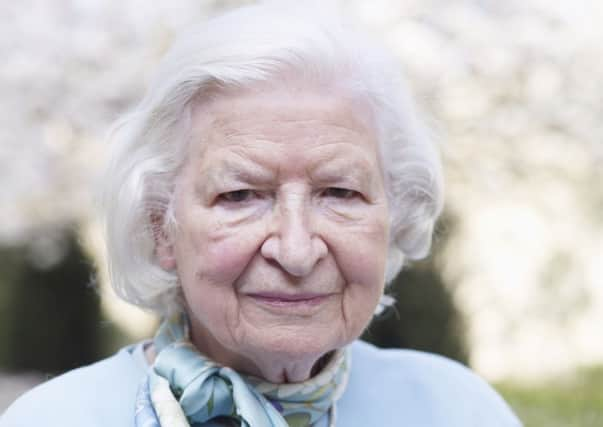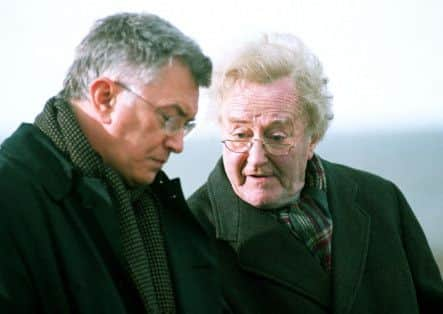The Big Interview: PD James


It is a truth universally acknowledged that any journalist writing about Pride and Prejudice is more or less legally obliged to begin the article in this manner.
It is another truth that a lady’s age is not something that should be discussed in polite company, and the age of a Baroness certainly not. So the fact that PD James volunteers the information without any prompting is probably the best demonstration that here is a woman who does not play by the rules.
Advertisement
Hide AdAdvertisement
Hide AdAnswering questions through a go-between who repeats them loudly and clearly (her hearing aid is switched on but the echoey room is not conducive to a quiet chat), PD James looks like one of those elderly ladies who would wither you with one look. She’s also whip smart.


“Sorry I have to have the questions repeated to me, that’s what happens when you are, well – 93 next week,” says PD James, who is officially a Baroness, but is referred to often by those around her – today at least – as “Lady James”.
Reflecting further on her grand old age, the writer adds: “All things rather close down eventually. I was waiting for the old brain to shut down, but I do hope that is the last thing to go.”
Judging by her work and by the way she holds the room, it’s easy to imagine that it will be some time before the brain “shuts down”.
Advertisement
Hide AdAdvertisement
Hide AdPD James, as she is best known, is the writer with more than one name. She is Baroness James of Holland Park, OBE, as well as Phyllis Dorothy White (James is her maiden name). When experimenting with a pen-name at the time her first novel was published in 1962, she considered Phyllis James and Phyllis D James before opting for the more enigmatic PD.
It is with those initials that she has published 20 books, most of which have been filmed and broadcast on television – very successfully in America – and around the world.
She came to writing after spending three decades in various departments of the British Civil Service and the attention to detail she learnt while in those jobs has proved invaluable in crafting her work as an author – although there is, one imagines, significantly more imagination involved in her work as one of the world’s leading crime fiction writing than there was in working for Government departments. One hopes.
These days of course, PD James has a great number of other responsibilities and roles – she still regularly lectures around the world, a couple of years ago was asked to guest edit the Today programme – and then there’s the politics.
Advertisement
Hide AdAdvertisement
Hide AdMade a life peer, she took a seat on the Conservative benches of the House of Lords in 1991. She drops into conversation the fact that “when you go to vote in the House of Lords there is a long corridor down which you walk and when I go down I often have people saying ‘shouldn’t you be off working on another novel?’.”
PD James is in Yorkshire, York Minster specifically, to witness yet another television adaptation of her work come into life, the number one bestselling Death Comes to Pemberley. The intriguing notion at the heart of the book is one of the reasons it has sold in its millions all over the world – it picks up after the end of Pride and Prejudice, and Darcy and Elizabeth are happily married and there are now two handsome and healthy sons in the nursery, Elizabeth’s beloved sister Jane and her husband Bingley live nearby and the orderly world of Pemberley seems unassailable.
But this is not purely Austen. This is Austen plus PD and so, obviously, murder is afoot. The lives of Darcy and Elizabeth are threatened when, on the eve of the annual autumn ball, as the guests are preparing to retire for the night a carriage appears, rocking down the path from Pemberley’s wild woodland. As it pulls up, Lydia Wickham – Elizabeth’s younger, unreliable sister – stumbles out screaming that her husband has been murdered.
James is practically clapping her hands in glee when she talks about the book.
Advertisement
Hide AdAdvertisement
Hide Ad“Murder is the ultimate crime. People talk about a ‘fate worse than death’ but from the victim’s point of view – what could be worse? There is something about a murder that separates the person who commits the crime from the rest of us. It is rather as though there is an invisible line and those who commit murder have crossed it, have done this irrevocable thing because they have taken something away that they do not have the power to give back. It is the ultimate crime and the very worst thing – what can you do? You can say you are sorry but, it’s not going to give anyone back, or assuage any grief of the person who loved him or her – the victim.
“It seems to rather be part of our collective story – in the Bible there is a murder very early on. If you have a detective story it’s much more exciting to find out why Aunt Ella was murdered at Brighton and had her necklace stolen than why the great aunt simply had her necklace stolen. You can make a novel of that but somehow it lacks something if she is not killed – brutally killed – in the process. Then it becomes a detective story and altogether more exciting I think.”
Yes. Sweet old lady, PD James.
She clearly loves a good old detective story – but it transpires that she loves an Austen almost as much.
Having achieved enormous success with her own invented characters, most obviously with detective Adam Dalgliesh over the past 47 years, she has had enormous fun, clearly, taking the characters invented by Austen and doing something new with them.
Advertisement
Hide AdAdvertisement
Hide Ad“It’s an idea I had at the back of my mind, I was busy writing my last detective story, The Private Patient and when I finished it, I thought well maybe I should write something a little shorter and this is a good opportunity to look at Pemberley again,” she says.
“What I had at the back of my mind was to combine my two great enthusiasms in life – at least in literary life – of writing detective fiction and Jane Austen. It would be a period story so I would have to make sure any police investigation was of its time.”
The relationship with Austen has lasted even longer than the relationship James has had with the detective fiction that has made her name.
“I was a child when I first read Pride and Prejudice, probably nine or 10. I don’t think I’d even started reading detective stories, they were of course recreational and fun stories for me but I don’t think I had read many of them then, I probably read Agatha when she was around,” says James – and yes, she does get to call her simply “Agatha”.
Advertisement
Hide AdAdvertisement
Hide Ad“I think it was the story that kept me reading, it is so beautifully written – it’s not too difficult for a child and yet there are great subtleties in it.
“As an adult I have re-read it often, certainly every year of my life – I know almost some of it almost by heart and everyone of course knows the opening line.”
James agrees with Austen that it is a special novel – Austen herself said that she could neither put up with nor have patience for anyone who did not love Elizabeth. Although she disagrees with one thing Austen said. “She felt it was ‘too entertaining’ and that it ought to have some dull moments – but of course it shouldn’t have any dull moments!
“She was quite, quite wrong, it can’t be too light really. It’s a very happy love story, as all her great novels are, with essentially the same plot.
“It’s Barbara Cartland really.”
Advertisement
Hide AdAdvertisement
Hide AdJames clearly doesn’t take herself too seriously, despite the acclaim and the latter career in politics.
While taking the liberties she did with Pride and Prejudice and crafting her sequel, she decided to sneak some of her own politics into Death Comes to Pemberley.
“I have a dig in there about the European community, a character is talking about a trial and they say ‘if we are not careful you might end up with foreign courts determining British courts and if they were to do so, we would lose far more than our liberty’.”
So how does she think Austen would feel about James slipping in some politics to Pemberley?
Advertisement
Hide AdAdvertisement
Hide Ad“According the critics I appear to have succeeded in writing in much the same style and it has been a bestseller wherever it has been published, notably the States where I think it’s been reprinted nine times. The publisher said ‘I can’t stop this book’, which suited me alright,” she says.
“I hope Jane Austen would have approved. I’m sure she’s not happy with some of the sequels. Had I realised how many there were, I might have hesitated, which would have been a shame. When we finished I said let’s get a list and see how many there are – there are so many – some of them with Darcy being very sexually odd to say the least. And zombies and – it’s incredible, really absolutely incredible.”
As is the 93-year-old who can hold a room with her wit and looks set to hold an audience of millions when her latest screen adaptation comes to UK television in December.